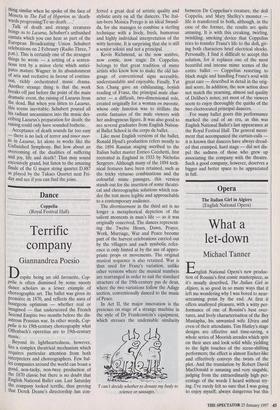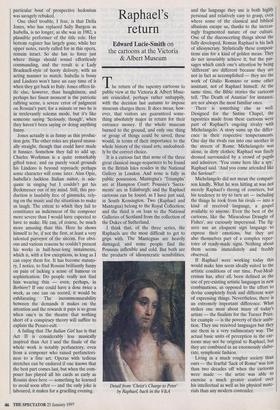Opera
The Italian Girl in Algiers (English National Opera)
What a let-down
Michael Tanner
English National Opera's new produc- tion of Rossini's first comic masterpiece, as it's usually described, The Italian Girl in Algiers, is so good in so many ways that it left me wondering why I was bored to near- screaming point by the end. At first it offers unalloyed pleasure, with a witty per- formance of one of Rossini's best over- tures, and lively characterisation of the Bey Mustapha, his unwanted wife Elvira and even of their attendants. Tim Hatley's stage designs are effective and time-saving, a whole series of Moorish arcades which spin on their axes and look solid while yielding to the light touches of the scene-shifting performers; the effect is almost Escher-like and effectively conveys the twists of the plot. And the translation by Robert David MacDonald is amusing and very singable, judging from the extraordinarily high per- centage of the words I heard without try- ing. I've rarely felt so sure that I was going to enjoy myself; always dangerous but this particular bout of prospective hedonism was savagely rebuked.
One chief trouble, I fear, is that Della Jones, who has replaced Sally Burgess as Isabella, is no longer, as she was in 1982, a plausible performer of the title role. Her bottom register has largely gone, while her upper notes, rarely called for in this opera, remain intact. So she has to force just where things should sound effortlessly commanding, and the result is a Lady Bracknell-style of hooty delivery, with an acting manner to match. Isabella is bossy and Lindoro won't have an easy time of it when they get back to Italy. Jones offers lit- tle else, however, than haughtiness, and perhaps her finest moment is the patriotic rallying scene, a severe error of judgment on Rossini's part; for a minute or two he is in irrelevantly solemn mode, but it's like someone saying 'Seriously, though', when they haven't been saying or doing anything funny.
Jones actually is as funny as this produc- tion gets. The other roles are played unusu- ally straight, though that could have made it funnier. Somehow they fail to add up. Charles Workman is a quite remarkably gifted tenor, and on purely vocal grounds his Lindoro is beyond reproach; perhaps some character will come later. Alan Opie, Isabella's luckless Italian suitor, is ade- quate in singing but I couldn't get his Beckmesser out of my mind. Still, this pro- duction is laudably free of gimmicks, rely- ing on the music and the situations to make us laugh. The extent to which they fail to constitutes an indictment of the composer more severe than I would have expected to have to make. He can, of course, be much more amusing than this. Here he shows himself to be, if not the first, at least a very talented purveyor of the sitcom. For obvi- ous and various reasons he couldn't present his works in half-hour-long instalments, which is, with a few exceptions, as long as I can enjoy them for. It has become statuto- ry, I notice, to find Rossini brilliantly funny on pain of lacking a sense of humour or sophistication. Do people really not find him wearing thin — even, perhaps, in Berbiere? If one could have a dose twice a week, as one can on record, it would be exhilarating. The incommensurability between the demands it makes on the attention and the rewards it pays is so gross when one's in the theatre that nothing short of a conspiracy theory will suffice to explain the Pesaro-cult.
A failing that The Italian Girl has is that Act II is considerably less musically inspired than Act I and the finale of the whole work is notably perfunctory, even from a composer who raised perfunctori- ness to a fine art. Operas with tedious stretches can be endured if one knows that the best part comes last, but when the com- poser has played all his cards as early as Rossini does here — something he learned to avoid soon after — and the only joke is laboured, it makes for a gruelling evening.



































































 Previous page
Previous page